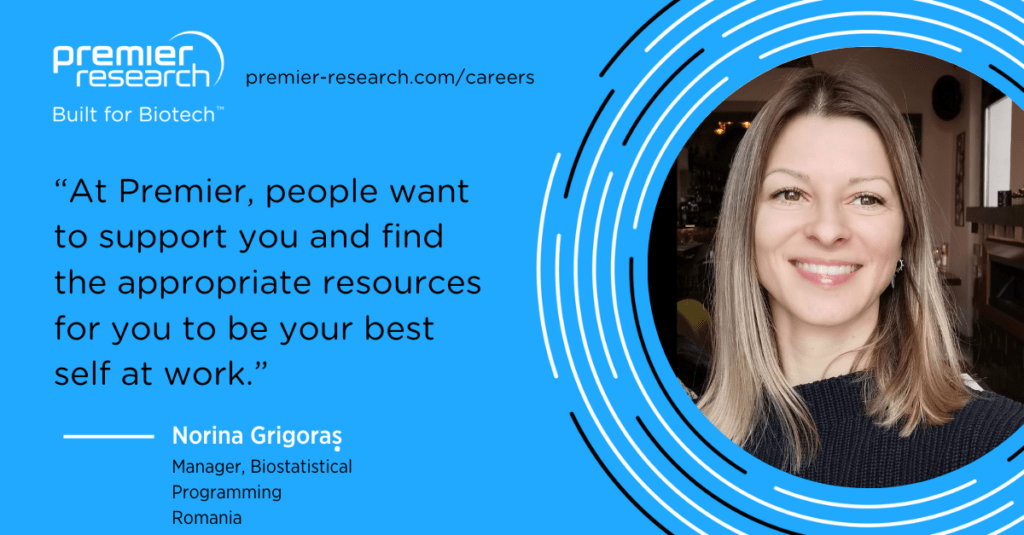
Culture Value: We Work Together
In college I studied psychology, which involves a lot of statistics, and I noticed that I liked it and I was good at it. So, I went for a master’s degree in statistics, specifically for the pharmaceutical industry. I quickly understood that was the right path for me.
I started as an associate programmer with a company primarily focused on the link between data management and statistics. We were mostly doing data cleaning and data standardization. I was much more interested in working on statistics, so I moved to a company that utilizes statistics in their studies. I enjoyed the work but found the pace too slow. At my next company I had the opposite experience; it was too big and too frantic.
A friend told me about Premier, and when I saw the company’s portfolio, I was excited. My master’s degree work was in Alzheimer’s disease, and I really wanted to work on more neuroscience studies. Even though Premier didn’t have an open position, they were willing to interview me—and the interview was really enjoyable, different from other companies I have talked to. There was a technical aspect, but also a strong emphasis on getting to know me.
Afterwards, I thought, “I would really like them to say, ‘Hey, we’re going to make a place for you here.’” But I didn’t have any expectations. And then, two months later, they actually created a spot and invited me to join the team.
Premier had just won a study that was a perfect fit for my experience. The study was well-built, which makes a tremendous difference. The team was great. My manager was great. The pace was great. I was super happy.
Then, when someone from the team left, I took over the study—and have been moving up ever since. And every time I’ve progressed, I have had support. That was something I felt during my interview process.
Although I was interviewing for a position as a statistical programmer, I said I was interested in moving to biostatistics. I know statistical theory, but I didn’t have the practical experience. Premier said they would support that transition—but every other company I have worked for has said that, too.
Here’s the difference: A few months after I joined Premier, my manager asked about my transition plan and if I wanted help drafting it. I learned that at Premier, if you ask for something and you’re willing to put the work in, you can actually get it. People want to support you and find the appropriate resources for you to be your best self at work. Ultimately, I decided I was more curious about management than biostatistics. And if it turns out that in a couple of years I want to do something besides management, I feel like I can still be here and find a place for myself.
Every company tells you, “We are a great big family.” At Premier, it’s true. Here’s another example. We have a group chat with everyone in our department, even upper management. Soon after I started, someone put a question in the chat asking how to do something. I panicked, thinking they shouldn’t admit to the whole group that they didn’t know the answer. But that’s how we do things at Premier. It makes sense. Why waste time trying to figure something out when your colleagues may know the answer?
With Premier, I know people do care. We are all ambitious on the team, and we make things happen. but people also get support. We are always sharing the load. I really like it here.
If you are interested in working for a company where support and connection is a priority, Premier Research could be a great fit. See open positions here.
